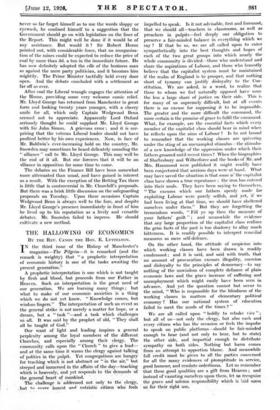THE HALLOWING OF ECONOMICS
BY THE REV. CANON THE HON. E. LYTTELTON.
• IN the third issue of the Bishop of Manchester's magazine—The Pilgrim—it is remarked (and the remark is weighty) that "a prophetic interpretation of economic history is one of the tasks awaiting the present generation."
A prophetic interpretation is one which is not taught by flesh and blood, but proceeds from our Father in Heaven. Such an interpretation is the great• need of our generation. We are learning many things ; but what to make of our economic anxieties is a thing which we do not yet know. "Knowledge comes, but wisdom lingers." The interpretation of such an event as the general strike is not merely a matter for hope, or a dream, but a "task "—and a task which challenges us all. It was said by the prophet of old, "They shall all be taught of God."
Our want of light and leading inspires a general perplexity among the loyal members of the different Churches, and especially among their clergy. The community calls upon the " Church " to give a lead— and at the same time it warns the clergy against talking of polities in the pulpit. Yet congregations are hungry for teaching which is not abstract or "in the air," but steeped and immersed in the affairs of the day—teaching which is heavenly, and yet responds to the demands of the general heart of mankind. ' . - The challenge is addressed not only to the clergy, , but ti every honest and natriotic citizen wh6 feels impelled to speak. Is it not advisable, first and foremost, that we should all—teachers in classrooms, as well as preachers in pulpits—feel deeply our obligation to preserve a fair-minded balance -in everything which we say ?• If that be so, we are all called upon to enter sympathetically into the best thoughts and hopes of each of the two great groups into which nearly the whole community is divided—those who understand and share the aspirations of Labour, and those who honestly believe that the capitalist system must be maintained if the realm of England is to prosper, and that nothing short of tyranny can justify disloyalty to the Con- stitution. We are asked, in a word, to realize that those to whom we feel naturally opposed have none the less a large share of justice on their side. This is for many of us supremely difficult, but at all events there is no excuse for supposing it to be impossible. The greater and the more difficult the command, the more certain is the promise of grace to fulfil the command. What, for example, are the essential facts which every member of the capitalist class should bear in mind when he reflects upon the aims of Labour ? Is he not bound to remember that the working classes are quivering under the sting of an unexampled stimulus—the stimulus of a new knowledge of the oppression under which their fathers groaned until recent times? When the biographies of Shaftesbury and Wilberforce and the books of Mr. and Mrs. Hammond were published it might readily have been conjectured that anxious days were at hand. What may have saved the situation is that some o7 the capitalist class have shown a true repentance : the iron has entered into their souls. They have been saying to themselves, "The excuses which our fathers openly made for exploiting Labour were purely selfish, and yet, if we had been living at that time, we should have sheltered ourselves under them." But they are forgetting the tremendous words, "Fill ye up then the measure of your fathers' guilt " ; and meanwhile the evidence that any large proportion of the capitalist class realizes . the grim facts of the past is too shadowy to allay much , bitterness. It is readily possible to interpret remedial measures as mere self-defence.
On the other hand, the attitude of suspicion into which working classes have been drawn is readily condemned ; and it is said, and said with truth, that no amount of provocation excuses illegality, coercion and disloyalty to the principles of democracy—to say nothing of the unwisdom of complete defiance of plain economic laws and the grave increase of suffering and unemployment which might easily have been seen in advance. And yet the question cannot but occur to the mind, "Who is responsible for the. blindness of the working classes in matters of elementary political economy ? Has our national system of education failed to meet the needs of the times ? "
We are all called upon "boldly to rebuke vice " ; but all of us—not only the clergy, but also each and every citizen who has the occasion or feels the impulse to speak on public platforms—should be fair-minded enough to hear (and not only to hear, but to state) the other side, and impartial enough to distribute sympathy on both sides. Nothing but harm comes from an attempt tO Apportion blame. And meanwhile - full credit inust be given to all the parties concerned for all the many- evidences of promptitude in • service, good humour, and resolute onierliness. Let us remember that these good qtialities are a gift from Heaven ; and instead of vaunting ourselves upon them; let us recognize the grave and --solemn responsibility which is laid upon us' for their right use.






















































 Previous page
Previous page